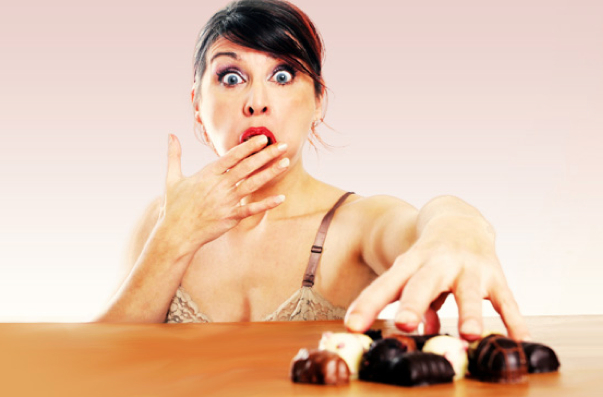8 Counterintuitive Food Tricks To Help You Lose Weight


Image source
Here are some counterintuitive food tips to help you lose weight.
You might be surprised by how eating can help you shed those kilograms!
Stop counting your calories.
Most weight loss plans will tell you to count calories, but it’s not really a good way to help you lose weight. Here’s why: a calorie is the amount of heat needed to raise one kilogram of water by one degree Celsius. The calorie composition of food used to be measured by setting the food on fire and seeing how well the flame warmed a big tub of water. The thing is – the body isn’t a big tub of water!
Furthermore, your body handles different sources of calories in different ways. For example, for every 100 grams of carbs you consume, your body uses 5 – 10% of those in digestion. It’s slightly less with fat. With protein, your body uses 20 – 30 % of its intake for digestion.
Even more importantly, calorie counting leads to counter-regulation – or the “what the hell” effect. When human beings’ behaviour is being controlled by something, we can only tolerate it for so long because we rebel. In terms of weight loss, that means we will eventually say “what the hell” and eat what we choose. And we just don’t take a little trip to the “dark side” – we go to the extreme. Instead of eating a piece of cake, we eat the whole thing!
When trying to lose weight, the best way to avoid counter-regulation is to not over-regulate (in other words, count calories). This is really where most weight loss plans fall down. By denying participants control, these plans ignore many of the most powerful motivational drives. These plans don’t meet our basic psychological needs, and then people find they can’t follow the plan anymore.
Eat more, weigh less
Eating small, regular meals can help you lose weight and keep it off. It might sound counter-intuitive, but think about it for a moment – how often have you skipped a meal and then over-compensated at dinner by having a huge serving, or picked from the fridge and pantry while you cooked because you were too starving to wait until food was on the table? Snacking on healthy foods prevents you from overindulging at mealtimes, boosts your metabolism, improves your digestion and fat-burning capabilities and helps you keep your portion sizes under control.
Can’t stop eating? Here’s why!
Have you ever kept eating your way through a packet of your favourite flavour of TimTams even though you’re not actually hungry anymore? That compulsive urge to finish eating a food that you love even when your stomach begins to feel uncomfortable is more common than you think. In fact, Italian researchers have recently discovered that our bodies are wired to keep eating when faced with delicious foods.
Our bodies are still programmed to load up on calories when they have the opportunity, in case famine is around the corner – a situation that was likely when we were still wearing animal skins, but that hardly applies anymore to many of us in contemporary Western society.
So how can we override our most basic biological urges? The simplest solution is simply not to put ourselves in the path of temptation. Clean your fridge and pantry of junk, and when you do buy treat food, divide it into reasonable portions so that you won’t be tempted to sit and work your way through a whole packet in one go.
Eat 300 fewer calories a day
Experts in the U.S. recently discovered that people who have lost a significant amount of weight actually need to eat 300 fewer calories a day – the equivalent of your average chocolate bar – than people of the same weight who haven’t dieted to reach that size.
But it isn’t all bad news. What this research goes to show is simply that dieting isn’t the answer – the only way to lose weight and keep it off is to change your habits for good.
Eat fat, get thin!
We’re so used to hearing about how bad fat is that we tend to automatically assume that any food with a high fat content has to be unhealthy. Experts interviewed for a recent article in the Chicago Tribune agree that fat isn’t just an important part of a balanced diet, but can actually help you lose weight – provided you choose the right kind of fat.
So how can fat be good for you, and what fats should you be eating? Here’s a simple breakdown:
- Stick to omega 3 fats, not omega 6 fats. Omega 3 fats are found in oily fish such as salmon and mackerel, seeds, nuts, olive oil and flaxseed oil. Omega 6 fats are generally found in processed or fried foods.
- The more omega 6 fats you consume, the harder it is for your body to store omega 3 fats. Omega 3s are incredibly important – they can reduce inflammation, improve heart health and even help with conditions such as arthritis, depression and ADHD.
- Try to avoid low-fat products – they’ll often have extra sugar or additives in them to make up for the loss of flavour caused by their lack of fat. If in doubt, ask yourself if your grandmother would recognise it as food. If the answer is no, put it back on the shelf.
- Full-fat products help you feel fuller for longer. If you try to fill up on low-fat alternatives, you’ll probably end up eating more because you won’t feel satisfied. You only need a little bit of the real thing to sate your cravings.
Still not convinced? Consider the facts: in Japan, where the national diet tends to be high in omega 3 fats and low in omega 6 fats, only one in 20 women is overweight. In America today, where consumption of omega 6 fats far outweighs consumption of omega 3 fats, one in three women is overweight.
Don’t forget that drinking plenty of water, reading nutrition labels and eating small, regular meals throughout the day are also essential to a healthy diet.
Sweeten up – chocolate for breakfast anyone?
If you’ve ever really fancied a slice of cake for breakfast, you’ll be thrilled by new research in the UK, which found that morning is the best time of day to eat sweet treats. Why? Because that’s when our metabolisms are working at their highest rate, and we’ve got all day to burn off what we’ve eaten. Having a treat at breakfast time could also help keep prevent cravings later on.
While this doesn’t mean that you should start your day with a plate of doughnuts, it does go to show that denying yourself isn’t the answer – in other words, yet more evidence that diets don’t work! Breakfast isn’t just important, it’s essential – and so is allowing yourself a little bit of what you love to prevent constant cravings.
It pays to be healthy.
It’s a common misconception that unhealthy foods tend to be cheaper than healthy ones. In fact, The Wall Street Journal recently reported that healthy eating isn’t as expensive as you might think: while consumers eat fewer calories per dollar when they make healthy choices, the price of healthy food by weight or portion size works out better than the price of unhealthy food. What’s more, since junk food is made up of empty calories, it often leaves consumers feeling unsatisfied, and so they buy more of it and end up spending more money. Spend wisely – make a healthy choice. It pays in more ways than one!
Eat more to weigh less.
You might think we should be filling our plates to lose weight rather than shrinking our serving sizes. However, it’s what we put on our plates that is important – and that should be plenty of vegetables and low-fat protein.
It’s an argument that makes sense psychologically as well as nutritionally. Studies show that people tend to eat whatever’s put in front of them. If the plate is piled high with low-fat protein and veggie, the person is getting a great meal filled with vitamins and fibre. It also helps fill you up and prevent you from reaching for the chocolate stash later on.
When you’re trying to lose weight, there is no need to starve yourself or feel deprived. Follow these counterintuitive food tricks, and you will be on your way to permanent weight loss!
Sally Symonds is director of the online weight loss system, Love Your Weight Loss, author, speaker and one of the few people who has lost over 50% of her original body weight and kept it off.










